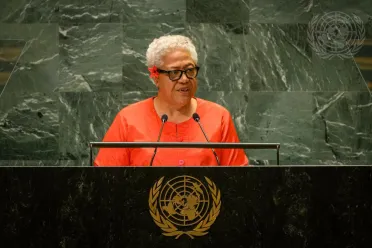Statement
Statement summary
FIAMĒ NAOMI MATA'AFA, Prime Minister and Minister for Foreign Affairs and Trade of Samoa, said the effects of climate change are being lived in real time, from ferocious wildfires to devastating floods and scorching heatwaves, particularly the Category 5 Hurricane Beryl whose devastation hit the Caribbean as well as parts of Mexico, Venezuela and the United States in July. “Our collective efforts must not end at national borders”, she said, counselling that the global community must learn from history to not tread the easier path of abandoning the collective to safeguard the individual in difficult times. As climate change poses serious challenges for food, water and energy supplies, and forced migrations, particularly for small island developing States, she called on Member States to “honour our commitments and obligations, and to take urgent and ambitious climate action now”. The outcomes of the first global stocktake to ensure that new nationally determined contributions due in 2025 are as ambitious as possible should be reviewed.
Noting the adoption earlier in the week of the Declaration of Sea Level Rise and Statehood, she said: “Our statehood and sovereignty cannot be challenged” regardless of the physical changes occasioned by the climate crisis. She committed to ensuring that Samoa’s ocean spaces, resources and ecosystems will remain healthy for current and future generations. Because of the threats posed by demands on her country’s critical marine resources, the Samoa Ocean Strategy was launched in 2020 to not only sustainably manage the nation’s resources but also serve to advance ocean stewardship and ensure that cultural and economic values derived from the ocean continue to be available to all generations. “We call on our partners to continue working with us to combat illegal, unreported and unregulated fishing which deprives us of resource benefits and undermines our management efforts,” she said. On the global plastic pollution problem, her Government will continue to engage with the Intergovernmental Negotiating Committee on Plastic Pollution for an internationally legal binding instrument on this issue.
She underscored the need to protect the world’s terrestrial and marine biodiversity, as “healthy biological diversity maintains the web of life that we rely on, such as food, water, medicine, economic growth, and sustainable livelihoods”. When mangroves and reef systems are protected, she continued, resilience capabilities to climate change-driven erosion and flooding are increased, thereby supporting healthy ecosystems and the sustainable well-being of coastal communities. Highlighting food security as a priority requiring food system transformation, she said “we must return to locally produced quality fresh foods with less reliance on processed imported foods”.
Because most small island States face high indebtedness, which is compounded in times of natural disaster, she supported the work of Systematic Observations Financing Facility and the Risk-informed Early Action Partnership and anticipated the timely and effective implementation of the multidimensional vulnerability index by international financial institutions and development partners as a tool to assist these States in accessing finance. She also requested digital capacity-building support for small island developing States. Lamenting the loss of civilian lives in Gaza, she called for a cessation of arms provision to the ensuing conflict, also calling for Security Council reforms to ensure greater regional representation. “The more things change, the more we cannot afford to stay the same. The tools of a foregone era can no longer ensure our future,” she stressed.
Fiame Naomi Mata’afa, Prime Minister of Samoa, also raised the alarm on climate change, calling for scaling up of investments to adapt to and mitigate its impact.
“We are not even at the end of 2024, yet we have witnessed countries in all corners of the globe endure extreme weather events – from ferocious wildfires to devastating floods and scorching heatwaves,” she said.
She highlighted the vulnerabilities of small island developing States, noting that its impacts are more extensively felt due to their special circumstances and the lack of capacity to respond quickly and effectively.
Outlining the implications of climate change, which could manifest in food insecurity, lack of water or energy supplies, competition over natural resources, loss of livelihoods and forced migration, the Samoan leader called for urgent and substantial investments to mitigate climate change, boost adaptation, and build more resilient economies.
“We must do more to turn the tide, to honour our commitments and obligations, and to take urgent and ambitious climate action now,” she said.
Full statement
Read the full statement, in PDF format.
Photo

Previous sessions
Access the statements from previous sessions.
